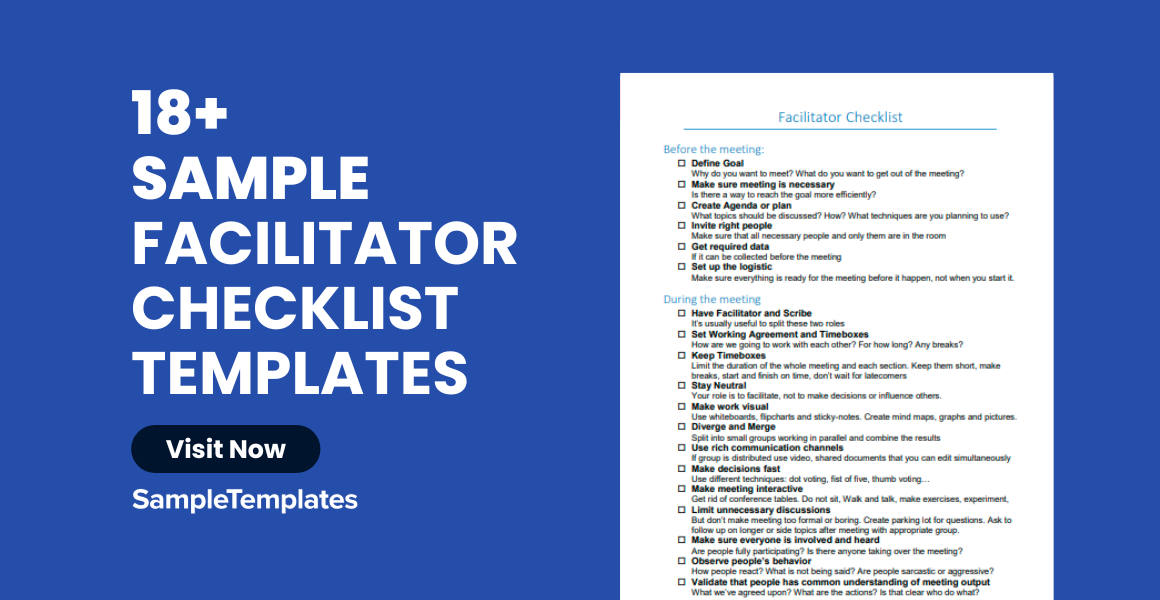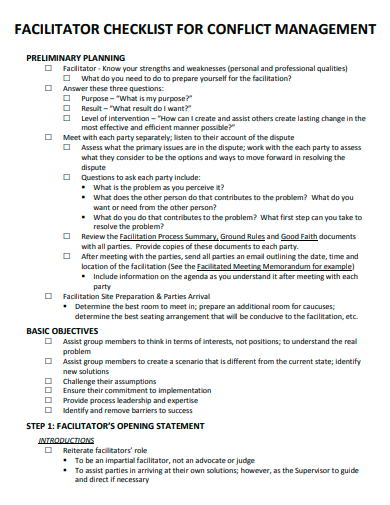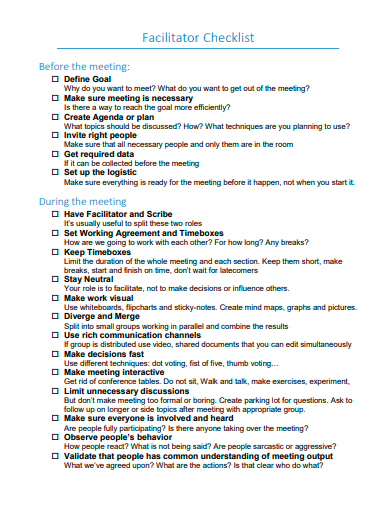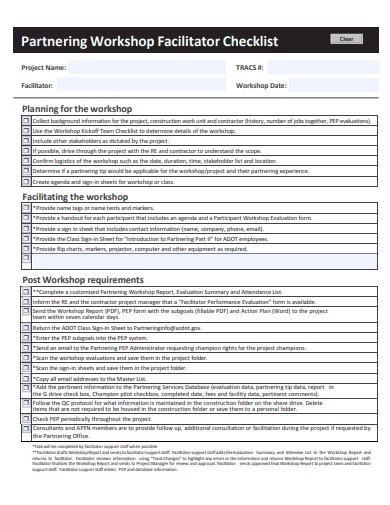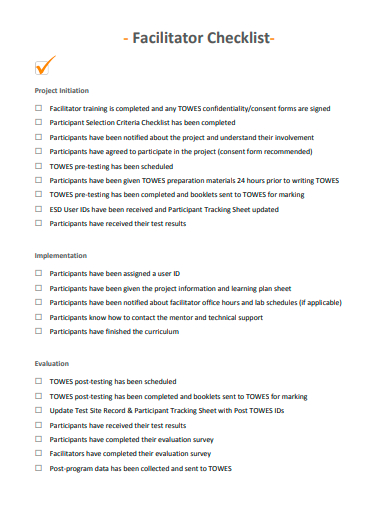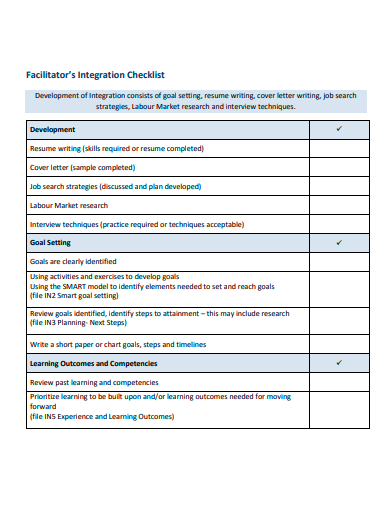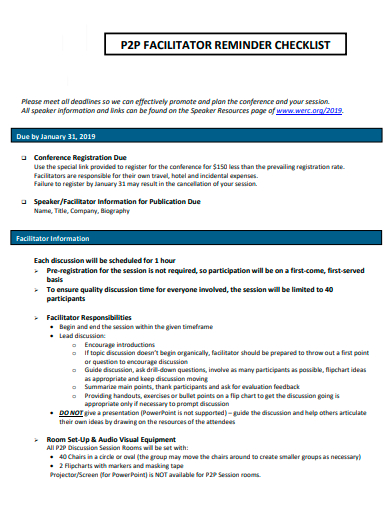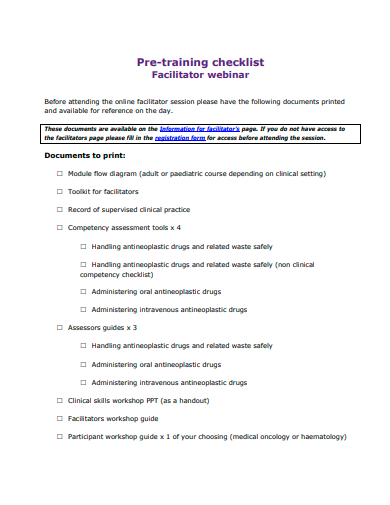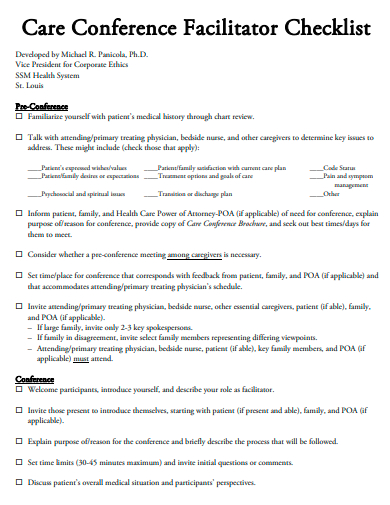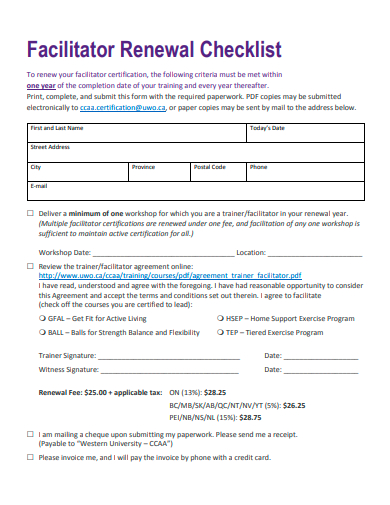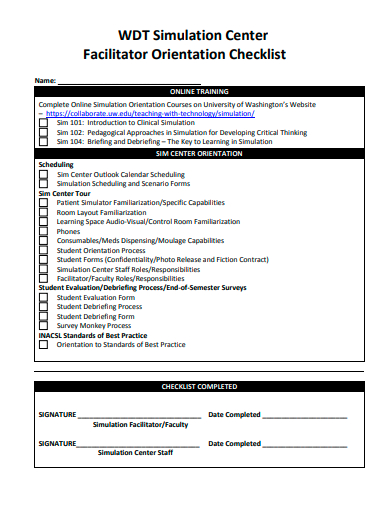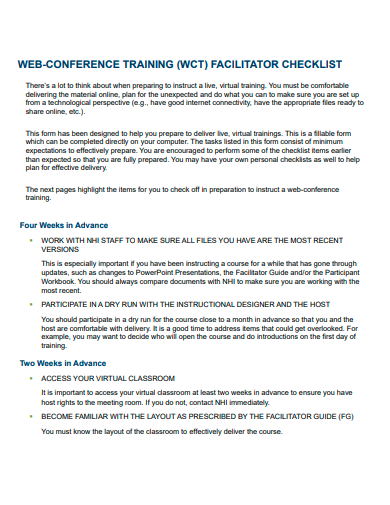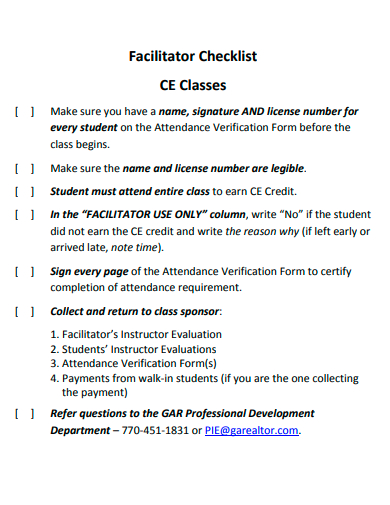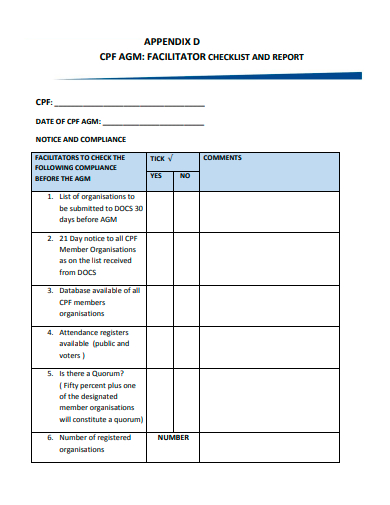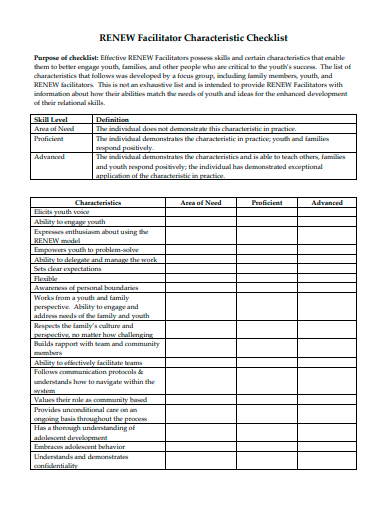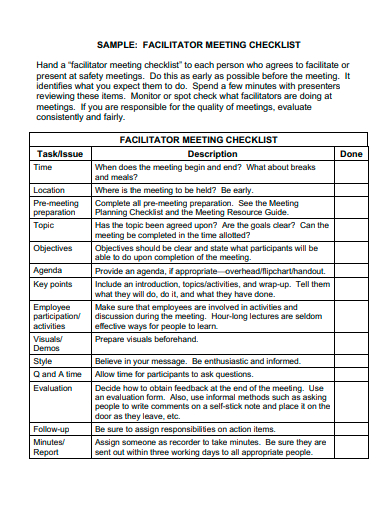In the dynamic world of workshops and group activities, a skilled facilitator is essential. The ‘Facilitator Checklist’ offers a comprehensive guide to ensure every session runs smoothly. Packed with best practices, this sample checklist ensures that facilitators are well-prepared, focused, and adaptable. Whether you’re a seasoned professional or just starting out, these curated pointers will elevate your sessions, making them more productive and engaging. Dive in to optimize your facilitation skills today.
18+ Facilitator Checklist Samples
1. Sample Checklist Template
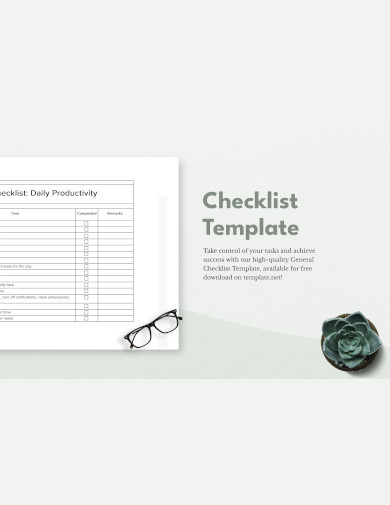
2. Basic Checklist Template
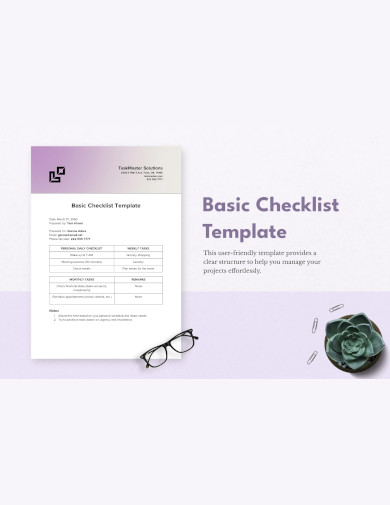
3. Formal Checklist Template
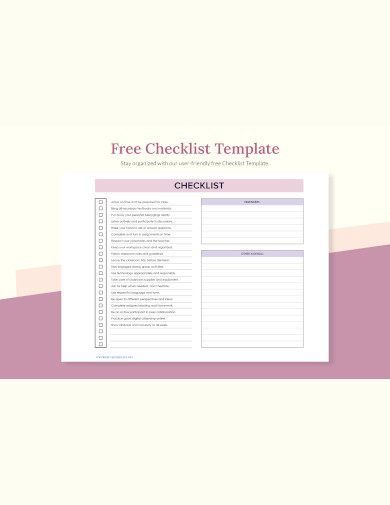
4. Printable Checklist Template
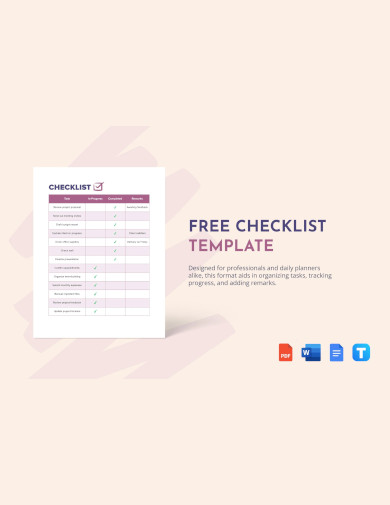
5. Sample Facilitator Checklist For Conflict Management
What is a Facilitator Checklist?
Facilitating a meeting, workshop, or event requires a combination of sample planning, foresight, and the ability to adapt in real-time to the needs of the group. One of the essential tools in the arsenal of a good facilitator is the facilitator checklist. This guide will delve deep into what a facilitator checklist is and why it’s invaluable for those in the role of guiding group processes.
Understanding the Facilitator Checklist
A facilitator checklist is a comprehensive sample list that ensures a facilitator has everything they need to run a session smoothly and effectively. It’s more than just a simple to-do list; it’s a roadmap to a successful event, detailing every step of the process from preparation to closure.
Purpose and Importance
The primary purpose of a facilitator checklist is to ensure that the facilitator is well-prepared and that the session runs smoothly. Proper preparation can prevent potential obstacles and challenges, making the process more effective and efficient. Key reasons for its importance include:
- Preparation: Provides a structure for gathering necessary materials and setting up the environment.
- Guidance: Acts as a roadmap, ensuring the session follows a logical progression.
- Efficiency: Helps in managing time effectively, ensuring all sample agenda points are covered.
- Confidence: A well-prepared facilitator is more confident, leading to better facilitation.
The Value in Preparation
A common saying goes, “By failing to prepare, you are preparing to fail.” This adage is particularly true for facilitation. An sample event, especially one that is meant to be collaborative and engaging, can quickly become chaotic without proper planning. A facilitator checklist serves as a planning tool, helping the facilitator anticipate needs, gather necessary materials, and be mentally prepared for potential challenges.
Key Components of the Checklist
A comprehensive facilitator checklist might include:
- Objective and Goals: Clearly defined aims of the session, ensuring alignment with the group’s needs.
- Materials Needed: From markers, sticky notes, to tech equipment like projectors and microphones, having a printable checklist ensures no essential item is forgotten.
- Agenda: A step-by-step guide for the session, with time allocations to keep everything on track.
- Roles and Responsibilities: This can include co-facilitators, timekeepers, note-takers, and more. Knowing who is responsible for what can help in distributing tasks and managing group dynamics.
- Feedback Mechanisms: Plan for collecting a sample feedback during and after the session, ensuring continuous improvement for future events.
Why is it Important?
Facilitating can be a daunting task, and without proper planning, many things can go awry. The checklist ensures that all bases are covered, from logistics to content and group dynamics.
- Prevention of Oversights: Ensuring all materials, equipment, and sample plans are in place.
- Boosting Confidence: Knowing that you’ve planned for all eventualities can boost a facilitator’s confidence.
Adapting to Dynamic Situations
Facilitation is not always predictable. Participants can bring unexpected perspectives, and discussions can veer off course.
- Having a Plan B: A good checklist will have alternative plans or activities if certain aspects don’t go as planned.
- Feedback Loops: Incorporating ways to get real-time feedback, allowing the facilitator to adjust on the fly if necessary.
Incorporating Feedback for Future Iterations
A facilitator’s work doesn’t end when the session closes. Reflecting on what went well and what can be improved is crucial.
- Post-Session Reflection: Taking time to note down observations, successes, and areas for improvement.
- Continuous Improvement: Updating the checklist based on feedback ensures that each subsequent session is better than the last.
Types of Facilitator Checklist:
Facilitator checklists can vary based on the purpose of the session, the audience, and the specific goals at hand. Here are some common types of facilitator checklists:
- Preparation Checklist: This focuses on all the items and tasks that need to be completed before the session. It might include items like arranging materials, confirming attendees, or setting up the venue.
- Session Agenda Checklist: This simple outlines the flow of the session, including timings, topics to be covered, and allocated breaks.
- Materials and Equipment Checklist: A list of all tangible items required for the session, such as markers, flip charts, projectors, laptops, or sample handouts.
- Facilitation Skills Checklist: A guide for the facilitator to ensure they’re employing effective facilitation techniques. This could include engaging participants, managing time, handling conflicts, or ensuring clarity in communication.
- Participant Engagement Checklist: Ensures participants are actively involved and that their needs and feedback are addressed. It might include items related to feedback collection, breakout sessions, or group discussions.
- Evaluation and Feedback Checklist: Used post-session to gather feedback from participants about the session and the facilitator’s performance. It aids in understanding what went well and what areas need improvement.
- Logistics and Setup Checklist: Concentrates on the physical setup of the venue, including seating arrangements, tech setup, and ensuring necessary amenities are available.
- Emergency and Contingency Checklist: Preparedness for any unforeseen events or disruptions. This might include backup plans for power outages, unexpected absences, or changes in the agenda.
- Post-Session Reflection Checklist: Used by the facilitator after the session to reflect on their own performance, noting areas of strength and areas for growth.
- Continuous Improvement Checklist: A tool used to regularly update and refine facilitation processes based on feedback and changing needs.
6. Basic Facilitator Checklist Template
7. Sample Partnering Workshop Facilitator Checklist Template
8. Sample Formal Facilitator Checklist Template
9. Sample Facilitators Integration Checklist Template
10. Sample Facilitator Reminder Checklist Template
11. Sample Facilitator Webinar Pre-Training Checklist Template
12. Sample Care Conference Facilitator Checklist Template
13. Sample Facilitator Renewal Checklist Template
14. Sample Facilitator Orientation Checklist Template
15. Sample Web Conference Training Facilitator Checklist Template
16. Sample Classes Facilitator Checklist Template
17. Sample Facilitator Checklist nd Report Template
18. Sample Facilitator Characteristic Checklist Template
19. Sample Facilitator Meeting Checklist Template
How do you Create a Facilitator Checklist?
Facilitators play a pivotal role in ensuring group discussions, meetings, workshops, or training sessions run smoothly and yield the desired outcomes. With myriad tasks to handle and a variety of participants to manage, an organized approach becomes essential. Enter the facilitator checklist—a step-by-step guide to make certain you’re on track and prepared for your role. You can also see more templates like Meeting Checklist Samples. Here’s a guide on creating a meticulous facilitator checklist.
1. Understand the Objective:
The foundation of any effective facilitation is a clear understanding of its sample objectives. What is the ultimate goal of the meeting or workshop? Is it problem-solving, brainstorming, decision-making, or team building? By identifying the purpose, you can tailor your checklist to ensure all activities and discussions align with the desired outcome.
Example: If the objective is team-building, your checklist might include activities that encourage collaboration and open communication among team members.
2. Agenda Creation and Time Management:
Construct a detailed agenda that outlines the topics or activities planned. Ensure you allocate specific time slots for each item to prevent overruns and maintain focus. Remember to incorporate breaks, especially for longer sessions, and account for any introductory or closing remarks.
Example: For a 2-hour workshop, you might allocate:
- 10 minutes for introductions,
- 30 minutes for a group activity,
- 20 minutes for discussion,
- a 10-minute break,
- another 30 minutes for brainstorming, and
- 20 minutes for wrapping up and feedback.
3. Identify Needed Materials and Resources:
List out all materials, equipment, and resources required. This could include whiteboards, markers, post-it sample notes, digital tools for virtual sessions, handouts, or multimedia presentations. Ensure these are arranged or accessible ahead of time to avoid any last-minute hiccups.
Example: For a brainstorming session, you might need large sheets of sample paper, colored markers, and sticky notes for participants to write down and categorize their ideas.
4. Establish Ground Rules:
These are essential for maintaining decorum, ensuring constructive dialogue, and keeping discussions on track. Ground rules could include guidelines on speaking turns, maintaining respect, confidentiality agreements, or the use of electronic devices during the session.
Example: For a focus group discussion, rules might include “One person speaks at a time,” “Listen actively without interrupting,” and “All opinions are valid and should be respected.”
5. Feedback and Reflection:
Ensure your checklist has a segment dedicated to gathering feedback. Whether it’s a formal feedback form or an open discussion, understanding participants’ perspectives can offer insights for future improvements. Additionally, set aside some personal reflection time post-session to assess what went well and where enhancements can be made.
Example: After a training session, provide attendees with a digital feedback sample form addressing the content, activities, and your facilitation style.
What is a Facilitator Evaluation Checklist?
A facilitator evaluation checklist is a tool used to assess the effectiveness and performance of a facilitator during a session or workshop. It often contains criteria related to the facilitator’s preparation, ability to engage participants, clarity in conveying information, and responsiveness to group needs. By using this checklist, organizers or participants can provide feedback to the facilitator for improvement or acknowledgment of their skills.
In Conclusion, a facilitator checklist is an indispensable tool for anyone leading group sessions. It ensures preparedness, boosts confidence, and serves as a guideline to navigate the complexities of facilitation. Whether you’re a seasoned professional or a novice, a well-structured checklist can be the key to a successful facilitation experience. You can also see more templates like Evaluation Checklist Samples.
Related Posts
FREE 17+ Survey Checklist Samples in MS Word | Google Docs | PDF
FREE 18+ Internship Checklist Samples in MS Word | Google Docs | PDF
FREE 20+ Voluntary Checklist Samples in MS Word | Google Sheets | PDF
FREE 18+ Summary Checklist Samples in MS Word | Google Sheets | PDF
FREE 14+ Sponsorship Checklist Samples in MS Word | MS Excel | PDF
FREE 18+ Conference Checklist Samples in MS Word | Google Sheets | PDF
FREE 17+ Lesson Checklist Samples in MS Word | Google Sheets | PDF
FREE 18+ Progress Checklist Samples in MS Word | Google Docs | PDF
FREE 18+ Enrollment Checklist Samples in MS Word | Google Docs | PDF
FREE 18+ Graduation Checklist Samples in MS Word | Google Sheets | PDF
FREE 15+ Consent Checklist Samples in MS Word | Google Sheets | PDF
FREE 18+ Review Checklist Samples in MS Word | Apple Pages | PDF
FREE 18+ Submission Checklist Samples in MS Word | Google Docs | PDF
FREE 18+ Request Checklist Samples in MS Word | MS Excel | PDF
FREE 21+ Faculty Checklist Samples in MS Word | Google Sheets | PDF
